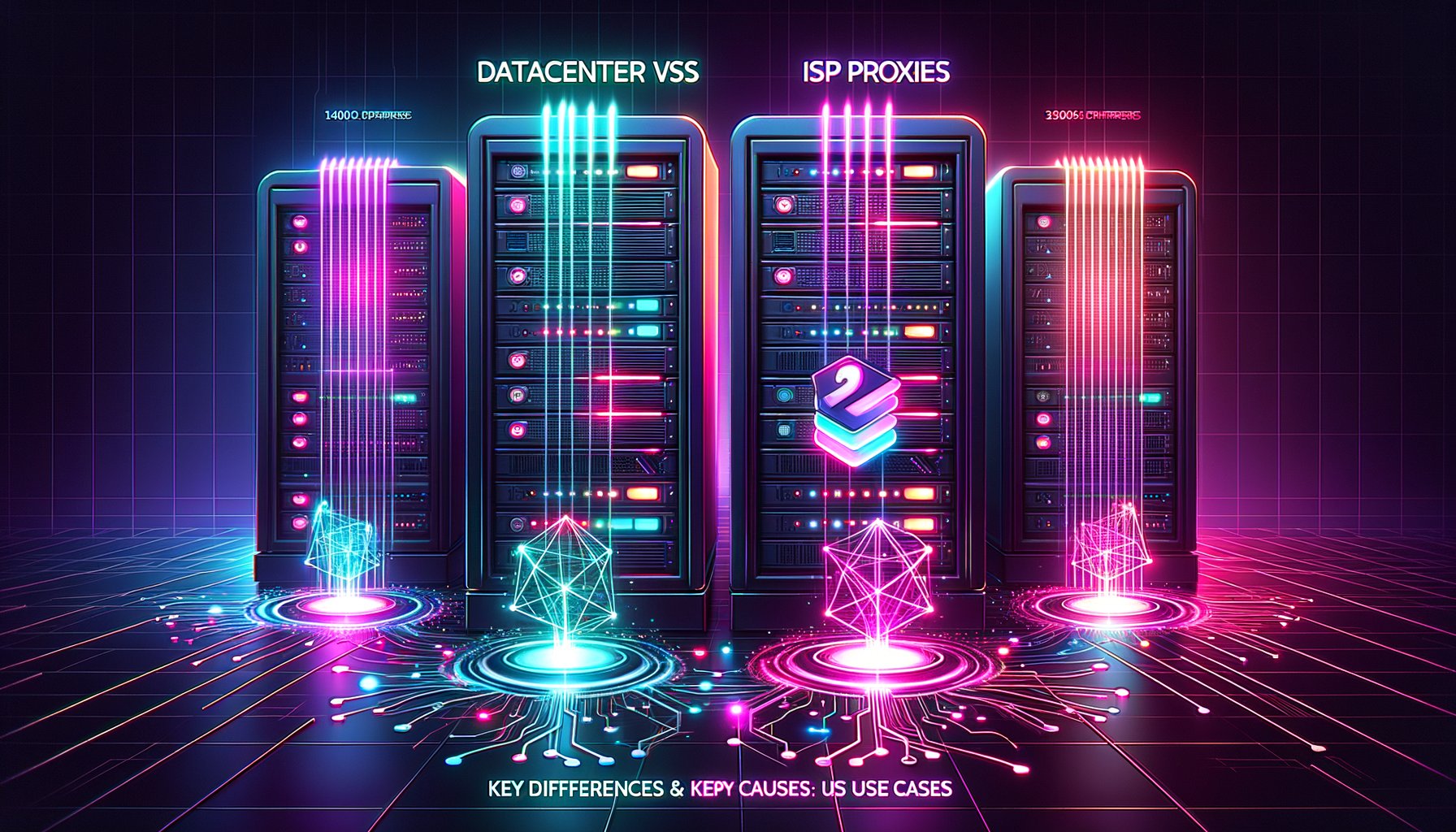In the dynamic world of online data acquisition, anonymity, and automation, proxies are indispensable tools. But with various types available, choosing the right one can be crucial for your project's success. Two common types often compared are Datacenter Proxies and ISP Proxies. While both offer IP masking and improved online functionality, they differ significantly in their origin, performance, and ideal use cases.
Understanding these distinctions is vital whether you're a developer, sneaker enthusiast, e-commerce business owner, or data scientist. This guide will break down the core differences between Datacenter and ISP proxies, helping you make an informed decision for your specific needs. At FlamingoProxies, we provide premium solutions for both, ensuring you have the reliable infrastructure you need.
What are Datacenter Proxies?
Datacenter proxies are IPs provided by commercial data centers. They are not associated with an Internet Service Provider (ISP) or a residential address. Instead, they are generated in bulk by large data servers. This makes them highly available, exceptionally fast, and generally more cost-effective than other proxy types.
Characteristics of Datacenter Proxies:
- High Speed: Hosted on powerful servers, they offer lightning-fast connection speeds, ideal for tasks requiring rapid data transfer.
- Cost-Effective: Their scalability and ease of generation make them a more budget-friendly option, especially for high-volume operations.
- Non-Residential IP: Websites can often detect that the IP address originates from a data center rather than a typical home connection.
- Large Pools: Datacenter proxy providers typically offer vast pools of IPs across various locations.
When to Use Datacenter Proxies:
Datacenter proxies excel in scenarios where speed and cost are paramount, and the target website has less stringent anti-proxy measures. They are perfect for:
- High-Volume Web Scraping: Collecting large amounts of publicly available data from non-sensitive sites.
- SEO Monitoring: Checking keyword rankings, competitor analysis, and ad verification.
- General Anonymity: Browsing the web anonymously without needing to mimic real users perfectly.
- Content Delivery Networks (CDNs): Testing global content delivery.
What are ISP Proxies?
ISP Proxies, sometimes referred to as 'static residential' proxies, bridge the gap between traditional datacenter and true residential proxies. They are hosted on datacenter servers but use IP addresses that are registered to Internet Service Providers (ISPs), making them appear as legitimate residential IPs. This unique characteristic gives them a significant advantage in specific use cases.
FlamingoProxies offers premium ISP proxies that combine the speed and reliability of a datacenter with the authenticity of a residential IP.
Characteristics of ISP Proxies:
- Residential IP Authenticity: Websites perceive them as real residential users, significantly reducing the chances of detection and blocking.
- High Speed & Stability: Unlike rotating residential proxies, ISP proxies are static and hosted on high-performance servers, offering consistent speed and reliability.
- Dedicated IPs: You typically get a dedicated IP that only you use, ensuring cleaner IPs and better performance.
- Moderate Cost: More expensive than datacenter proxies but generally more affordable than premium rotating residential proxies.
When to Use ISP Proxies:
ISP proxies are ideal for tasks that demand both speed and a high level of anonymity, especially when dealing with websites known for strict anti-bot measures. They are perfect for:
- Sneaker Botting: Securing limited-edition sneakers on release day.
- E-commerce Automation: Managing multiple online stores, price monitoring, or bypassing geographic restrictions.
- Social Media Management: Running multiple accounts without triggering security alerts.
- Advanced Web Scraping: Accessing sites with sophisticated bot detection, such as e-commerce platforms or booking sites.
- Online Gaming: For consistent, low-latency connections with a residential IP footprint.
Here's a simple Python example of how to use an ISP proxy with authentication:
import requests
proxy_username = 'YOUR_USERNAME'
proxy_password = 'YOUR_PASSWORD'
proxy_ip = 'PROXY_SERVER_IP'
proxy_port = 'PROXY_SERVER_PORT'
proxies = {
'http': f'http://{proxy_username}:{proxy_password}@{proxy_ip}:{proxy_port}',
'https': f'http://{proxy_username}:{proxy_password}@{proxy_ip}:{proxy_port}'
}
try:
response = requests.get('https://httpbin.org/ip', proxies=proxies, timeout=10)
response.raise_for_status() # Raise an exception for HTTP errors
print(f"IP used: {response.json()['origin']}")
except requests.exceptions.RequestException as e:
print(f"Request failed: {e}")
Key Differences: Datacenter vs. ISP Proxies
Let's summarize the main distinctions between these two powerful proxy types:
- IP Origin: Datacenter IPs originate from commercial data centers. ISP IPs are registered to legitimate ISPs but hosted in data centers.
- Detection: Datacenter IPs are easier for sophisticated websites to detect as non-residential. ISP IPs mimic real residential connections, making them much harder to detect.
- Speed: Both are very fast and stable, but ISP proxies offer this speed with the added benefit of residential legitimacy.
- Cost: Datacenter proxies are generally more affordable per IP. ISP proxies are a premium option, priced higher due to their unique characteristics.
- Best Use Cases: Datacenter for high-volume, less sensitive tasks. ISP for high-stakes, detection-sensitive tasks like sneaker botting, e-commerce, and challenging web scraping.
When to Choose Each Type?
Choose Datacenter Proxies for:
- Budget-sensitive projects requiring high speed.
- Web scraping public data from sites with minimal anti-bot protection.
- SEO monitoring, ad verification, and general market research.
- Tasks where IP detection as non-residential is not a critical issue.
Choose ISP Proxies for:
- Time-sensitive and high-value operations like sneaker releases and limited-edition product drops.
- E-commerce activities requiring a genuine residential footprint.
- Accessing websites with stringent anti-bot and geo-restriction measures.
- Managing multiple social media accounts or other platforms with strict security.
- Any scenario where mimicking a real user is crucial for success.
How FlamingoProxies Can Help
Whether you need the raw speed of datacenter proxies or the advanced stealth of ISP proxies, FlamingoProxies has you covered. Our infrastructure is built for reliability, speed, and performance, ensuring your operations run smoothly.
We offer a diverse range of Residential Proxies, ISP Proxies, and Datacenter Proxies, all backed by a robust global network and exceptional customer support. We understand the nuances of various online tasks and provide solutions tailored to meet the demands of developers, sneakerheads, e-commerce professionals, and data analysts.
Conclusion
Choosing between Datacenter and ISP proxies boils down to your specific project requirements, budget, and the sensitivity of your target websites. Datacenter proxies offer unparalleled speed and cost-efficiency for less demanding tasks, while ISP proxies provide a superior blend of speed and residential authenticity for challenging, high-stakes operations. By understanding their distinct advantages, you can deploy the most effective proxy solution.
Ready to power your online endeavors with the best proxy solutions? Explore our comprehensive proxy plans today and find the perfect fit for your needs. For more insights and guides, visit our Blog Hub or join our thriving Discord community for direct support and discussions!





